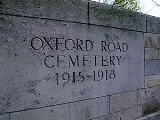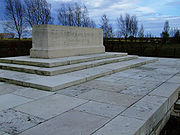
Oxford Road Commonwealth War Graves Commission Cemetery
Encyclopedia
Oxford Road Cemetery is a Commonwealth War Graves Commission
burial ground for the dead of the First World War
located near Ypres
(now Ieper) in Belgium
on the Western Front
.
The cemetery grounds were assigned to the United Kingdom
in perpetuity by King Albert I of Belgium
in recognition of the sacrifices made by the British Empire
in the defence and liberation of Belgium
during the war.
 The cemetery, named after the nickname of a nearby road behind the trenches, was established as two cemeteries. The first was laid down in August 1917. The second, nearby, was begun in 1917. After the armistice
The cemetery, named after the nickname of a nearby road behind the trenches, was established as two cemeteries. The first was laid down in August 1917. The second, nearby, was begun in 1917. After the armistice
, battlefield graves were consolidated between the two, creating one enlarged cemetery.
The cemetery was designed by Sir Reginald Blomfield
.
n-born Captain Clement Robertson
VC
is buried in this cemetery. He was posthumously awarded the Victoria Cross for valour on 4 October 1917 at Zonnebeke
.
Sergeant Colin Blythe
of the King's Own Yorkshire Light Infantry
, an exceptional spin bowler who had played for Kent
and England and was a Wisden Cricketer of the Year
in 1904.
Commonwealth War Graves Commission
The Commonwealth War Graves Commission is an intergovernmental organisation of six independent member states whose principal function is to mark, record and maintain the graves, and places of commemoration, of Commonwealth of Nations military service members who died in the two World Wars...
burial ground for the dead of the First World War
World War I
World War I , which was predominantly called the World War or the Great War from its occurrence until 1939, and the First World War or World War I thereafter, was a major war centred in Europe that began on 28 July 1914 and lasted until 11 November 1918...
located near Ypres
Ypres
Ypres is a Belgian municipality located in the Flemish province of West Flanders. The municipality comprises the city of Ypres and the villages of Boezinge, Brielen, Dikkebus, Elverdinge, Hollebeke, Sint-Jan, Vlamertinge, Voormezele, Zillebeke, and Zuidschote...
(now Ieper) in Belgium
Belgium
Belgium , officially the Kingdom of Belgium, is a federal state in Western Europe. It is a founding member of the European Union and hosts the EU's headquarters, and those of several other major international organisations such as NATO.Belgium is also a member of, or affiliated to, many...
on the Western Front
Western Front (World War I)
Following the outbreak of World War I in 1914, the German Army opened the Western Front by first invading Luxembourg and Belgium, then gaining military control of important industrial regions in France. The tide of the advance was dramatically turned with the Battle of the Marne...
.
The cemetery grounds were assigned to the United Kingdom
United Kingdom
The United Kingdom of Great Britain and Northern IrelandIn the United Kingdom and Dependencies, other languages have been officially recognised as legitimate autochthonous languages under the European Charter for Regional or Minority Languages...
in perpetuity by King Albert I of Belgium
Albert I of Belgium
Albert I reigned as King of the Belgians from 1909 until 1934.-Early life:Born Albert Léopold Clément Marie Meinrad in Brussels, he was the fifth child and second son of Prince Philippe, Count of Flanders, and his wife, Princess Marie of Hohenzollern-Sigmaringen...
in recognition of the sacrifices made by the British Empire
British Empire
The British Empire comprised the dominions, colonies, protectorates, mandates and other territories ruled or administered by the United Kingdom. It originated with the overseas colonies and trading posts established by England in the late 16th and early 17th centuries. At its height, it was the...
in the defence and liberation of Belgium
Belgium
Belgium , officially the Kingdom of Belgium, is a federal state in Western Europe. It is a founding member of the European Union and hosts the EU's headquarters, and those of several other major international organisations such as NATO.Belgium is also a member of, or affiliated to, many...
during the war.
Foundation

Armistice with Germany (Compiègne)
The armistice between the Allies and Germany was an agreement that ended the fighting in the First World War. It was signed in a railway carriage in Compiègne Forest on 11 November 1918 and marked a victory for the Allies and a complete defeat for Germany, although not technically a surrender...
, battlefield graves were consolidated between the two, creating one enlarged cemetery.
The cemetery was designed by Sir Reginald Blomfield
Reginald Blomfield
Sir Reginald Theodore Blomfield was a prolific British architect, garden designer and author of the Victorian and Edwardian period.- Early life and career :...
.
Notable graves
South AfricaSouth Africa
The Republic of South Africa is a country in southern Africa. Located at the southern tip of Africa, it is divided into nine provinces, with of coastline on the Atlantic and Indian oceans...
n-born Captain Clement Robertson
Clement Robertson
Clement Robertson VC was born at Pietermaritzburg, South Africa, and was a South African recipient of the Victoria Cross, the highest and most prestigious award for gallantry in the face of the enemy that can be awarded to British and Commonwealth forces.-Early Life:Clarence's father, a captain...
VC
Victoria Cross
The Victoria Cross is the highest military decoration awarded for valour "in the face of the enemy" to members of the armed forces of various Commonwealth countries, and previous British Empire territories....
is buried in this cemetery. He was posthumously awarded the Victoria Cross for valour on 4 October 1917 at Zonnebeke
Zonnebeke
Zonnebeke is a municipality located in the Belgian province of West Flanders. The municipality comprises the villages of Beselare, Geluveld, Passendale, Zandvoorde and Zonnebeke proper. On January 1, 2006 Zonnebeke had a total population of 11,758...
.
Sergeant Colin Blythe
Colin Blythe
Colin Blythe , also known as Charlie Blythe, was a Kent and England left arm spinner who is regarded as one of the finest bowlers of the period between 1900 and 1914 - sometimes referred to as the "Golden Age" of cricket.-Career:Blythe first played...
of the King's Own Yorkshire Light Infantry
King's Own Yorkshire Light Infantry
The King's Own Yorkshire Light Infantry was a regiment of the British Army. It officially existed from 1881 to 1968, but its predecessors go back to 1755. The regiment's traditions and history are now maintained by The Rifles.-The 51st Foot:...
, an exceptional spin bowler who had played for Kent
Kent County Cricket Club
Kent County Cricket Club is one of the 18 first class county county cricket clubs which make up the English and Welsh national cricket structure, representing the county of Kent...
and England and was a Wisden Cricketer of the Year
Wisden Cricketers of the Year
The Wisden Cricketers of the Year are cricketers selected for the honour by the annual publication Wisden Cricketers' Almanack, based primarily on their "influence on the previous English season"...
in 1904.

